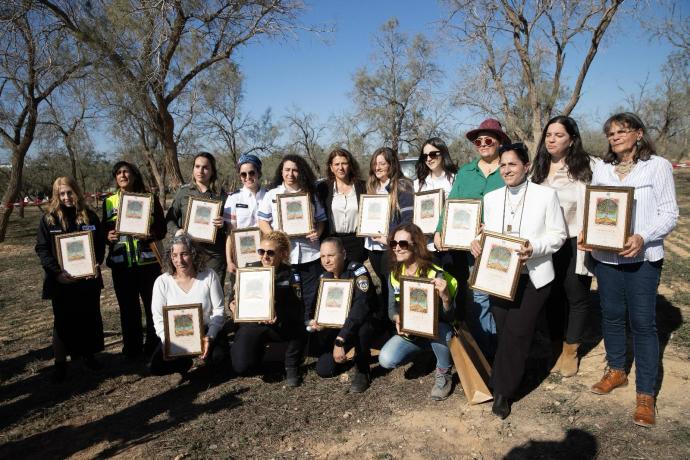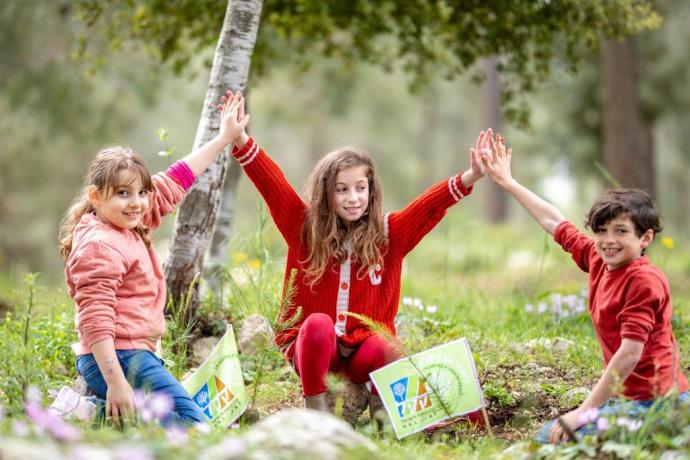In light of the very difficult situation that the Land of Israel is currently undergoing, KKL-JNF chairwoman Ifat Ovadia-Luski believes that the holiday of Tu Bishvat can “convey many positive messages to the people of Israel.”
“Tu Bishvat is the holiday of KKL-JNF,” she said.
“It symbolizes planting, renewal, hope for the future, and connecting to our roots. That is why we call upon the public this year – more than ever – to plant, restore the greenery, and connect to the earth and the Land of Israel.”
Ovadia-Luski considers that reforesting and replanting in the shadow of the massacre and devastation in Israel’s South are tremendously significant “in the healing that we will need, during and after the war.”

“There has been an attempt to uproot us from the communities along the Gaza border area and displace us from our roots. But we are a strong people, and we are not going anywhere. We will continue to grow, even though it is a challenging time,” said the KKL-JNF chairwoman.
At the start of the week, just ahead of Tu Bishvat, families who lost loved ones at the Supernova music festival participated in a tree-planting ceremony in the Kibbutz Re’im picnic area.
Ovadia-Luski said the event was very emotional, both as a commemoration ceremony and in terms of growth and renewal. “The entire grimy area will turn green with blooming trees,” she said.

The Path of the Heroines in Ofakim Park, another project initiated by Keren Kayemet LeYisrael – Jewish National Fund (KKL-JNF), commemorates the fallen heroines of Swords of Iron. “This is our way of saluting these brave women. Those who travel this route can scan a special code with their phones to hear the heroic stories of these courageous women in the war,” she explained.
In addition to annual public Tu Bishvat planting activities, KKL-JNF this year hosted many events for the benefit of civilians evacuated from their homes, as well as for those wounded and currently hospitalized, holding special Tu Bishvat Seders and carrying out activities in support of the soldiers.
“I am very proud that the existence of our organization is significant for the state and the people of Israel, and this allows us to contribute in all aspects,” Ovadia-Luski said.
“Later, we will also be required to rehabilitate the damaged areas and prepare the agricultural areas – to do everything that KKL-JNF knows how to do.”
She explained that when the war broke out, KKL-JNF was involved from the very start, supporting the emergency squads and assisting in the evacuation of residents. On that first day, KKL-JNF established a special operations room.
“It was an organizational operations room that also helped our employees evacuate the danger zones,” Ovadia-Luski recalled.
Many KKL-JNF employees risked their lives evacuating the wounded.
“Some took people fleeing the massacre in Re’im into their homes and were also part of the evacuation of the communities.”
KKL-JNF supports its employees unconditionally and ensures that all the necessary resources are available to them, including psychological assistance through the workers’ labor union and the HR department.
Ovadia-Luski has already begun preparing KKL-JNF for the day after the war: “We will have to allocate many resources toward the restoration of the forests.”
Unfortunately, she said, the destruction of forests has become a “recurring event.”
“After the Second Lebanon War, we were forced to rehabilitate the forests in the North. Today, many areas have been damaged, and this is KKL-JNF’s role as the chief forester of the State of Israel. We will rehabilitate the forests, and we will call on the public to be a part of this.”
Fighting for every tree
Danny Ben-David, director of the western Negev region of KKL-JNF, is a resident of the South. Miraculously, on that Black Shabbat, he was riding his bicycle in Lahav Forest, far from the border fence. Tragically, many of his friends were murdered that day, and some were wounded or kidnapped.
“When I noticed the rocket fire from Gaza, I told all the workers not to leave their homes,” he recalled.
Ben-David’s son is serving in the IDF. He guards the borders while his father guards the forests.
“In western Negev, we have been suffering mortar shells and incendiary balloons for years,” said Ben-David. “But we always have hope because if you have no hope, you have lost not only the forest but the entire country.”
Thanks to hope, he said, “We will fight for every tree, even if tomorrow it burns.
“Because we have hope, and we are certain that after this war, we will have years of quiet, we will rehabilitate the forest and renew the landscape of western Negev.”
Although Tu Bishvat is planting season and a time when the general public – especially children and youth – usually takes part in forest renewal and special ceremonies, this year brought planting restrictions to certain parts of the South and North of the country – and in some areas, only KKL-JNF workers did the planting. Virtual planting ceremonies and activities were held in retirement homes, moshavim, and educational institutions.
“Even if we can’t be on the ground because of the restrictions, we know how to reach the public,” he said.
Ben-David considers planting a tree in the Land of Israel to be a great mitzvah: “We’ve all been kids, and we understand the meaning. That’s why KKL-JNF invests a lot in education and information.”
‘Man is the tree of the field’
Galit Vaknin, director of the Public Reception Department of KKL-JNF’s Southern Region, is used to unsettling times in her area, but she never imagined a situation such as the present one.
“For over 100 years, KKL-JNF’s most prominent symbol has been Tu Bishvat, and this year we will not give up on it,” Vaknin emphasized, ahead of the holiday.
“Man is akin to the tree of the field, and for us, planting symbolizes new life and a new beginning. We are doing everything to enable the planting. We have adapted all the activities according to the instructions of the police and the Home Front Command.”
Vaknin described a variety of JNF activities in the areas of public relations, education, and absorption, such as Ta V’sa (Plant and Go), which enables members of the public to bring their families in their cars to plant trees in the forests and on the moshavim and kibbutzim in the South, and attend Tu Bishvat Seders.
“When a person plants a tree, especially with his family, he feels part of the land and the country,” she said.
She said that KKL-JNF also tries to reach out to the community as much as possible.
“We conduct Tu Bishvat Seders, which contain a great deal of experiential content and help us reach people who have difficulty going into nature. We bring the forest into the house. One of the projects we adapted to this task is growing seedlings in nurseries. We have three nurseries in the country – in the South, Center, and North.
“We also operate the Happiness Truck, which displays the KKL-JNF logo and is full of surprises and small seedlings. This truck meets soldiers in the South and North and in hospitals, wherever they need us,” she said.
For Vaknin, all this is indicative of KKL-JNF’s desire “to flourish and rehabilitate, to show that this is our country and that we are here to stay.”
Eli Hafuta, director of the JNF’s Upper Galilee and Golan Heights regions, discussed the security issues that this area, too, is facing.
This year, no events were held in areas near the border. “We will plant in quite a few areas in the North, but this year we will not hold mass events.”
Hafuta noted that KKL-JNF was continuing its regular work in the Golan Heights and creating projects to host the public in the Safed area and Mount Meron. Nevertheless, he said that it was possible that areas near the fence could continue to be off limits in the coming months.
“Fortunately for us, it’s winter,” Hafuta pointed out. “Being in the middle of a war, if it were July or August, every mortar shell or drone that landed would cause a forest fire. Right now, the ground is very wet, and everything is green, so the forests don’t burn from the missiles that have landed. We will wait.”
He concluded: “After the war, we will renew all the damaged areas, and the forests will flourish once again.”
Translated by Alan Rosenbaum.
This article was written in cooperation with KKL-JNF.
